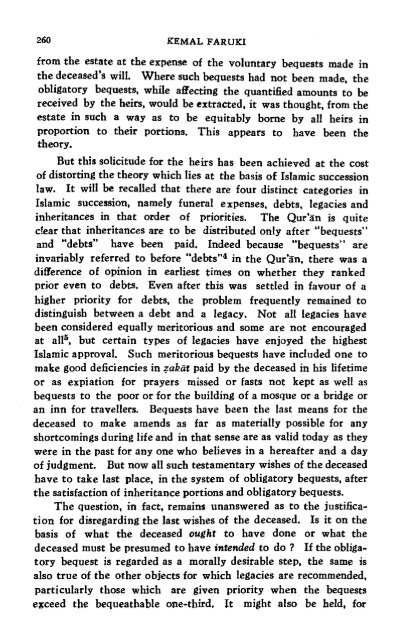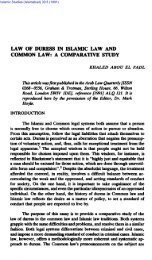ORPHANED GRANDCHILDREN IN ISLAMIC SUCCESSION LAW
ORPHANED GRANDCHILDREN IN ISLAMIC SUCCESSION LAW
ORPHANED GRANDCHILDREN IN ISLAMIC SUCCESSION LAW
Create successful ePaper yourself
Turn your PDF publications into a flip-book with our unique Google optimized e-Paper software.
260 KEMAL FARUKI<br />
from the estate at the expense of the voluntary bequests made in<br />
the deceased's will. Where such bequests had not been made, the<br />
obligatory bequests, while affecting the quantified amounts to be<br />
received by the heirs, would be extracted, it was thought, from the<br />
estate in such a way as to be equitably borne by all heirs in<br />
proportion to their portions. This appears to have been the<br />
theory.<br />
But this solicitude for the heirs has been achieved at the cost<br />
of distorting the theory which lies at the basis of Islamic succession<br />
law. It will be recalled that there are four distinct categories in<br />
Islamic succession, namely funeral expenses, debts, legacies and<br />
inheritances in that order of priorities. The Qur'an is quite<br />
c!ear that inheritances are to be distributed only after "bequests"<br />
and "debts" have been paid. Indeed because "bequests" are<br />
invariably referred to before "debtsw4 in the Qur'an, there was a<br />
difference of opinion in earliest times on whether they ranked<br />
prior even to debts. Even after this was settled in favour of a<br />
higher priority for debts, the problem frequently remained to<br />
distinguish between a debt and a legacy. Not all legacies have<br />
been considered equally meritorious and some are not encouraged<br />
at all5, but certain types of legacies have enjoyed the highest<br />
Islamic approval. Such meritorious bequests have included one to<br />
make good deficiencies in zakiit paid by the deceased in his lifetime<br />
or as expiation for prayers missed or Easts not kept as well as<br />
bequests to the poor or for the building of a mosque or a bridge or<br />
an inn for travellers. Bequests have been the last means for the<br />
deceased to make amends as far as materially possible for any<br />
shortcomings during life and in that sense are as valid today as they<br />
were in the past for any one who believes in a hereafter and a day<br />
of judgment. But now all such testamentary wishes of the deceased<br />
have to take last place, in the system of obligatory bequests, after<br />
the satisfaction of inheritance portions and obligatory bequests.<br />
The question, in fact, remains unanswered as to the justifica-<br />
tion for disregarding the last wishes of the deceased. Is it on the<br />
basis of what the deceased ought to have done or what the<br />
deceased must be presumed to have intended to do ? If the obliga-<br />
tory bequest is regarded as a morally desirable step, the same is<br />
also true of the other objects for which legacies are recommended,<br />
particularly those which are given priority when the bequests<br />
esceed the bequeathable one-third. It might also be held, for
















